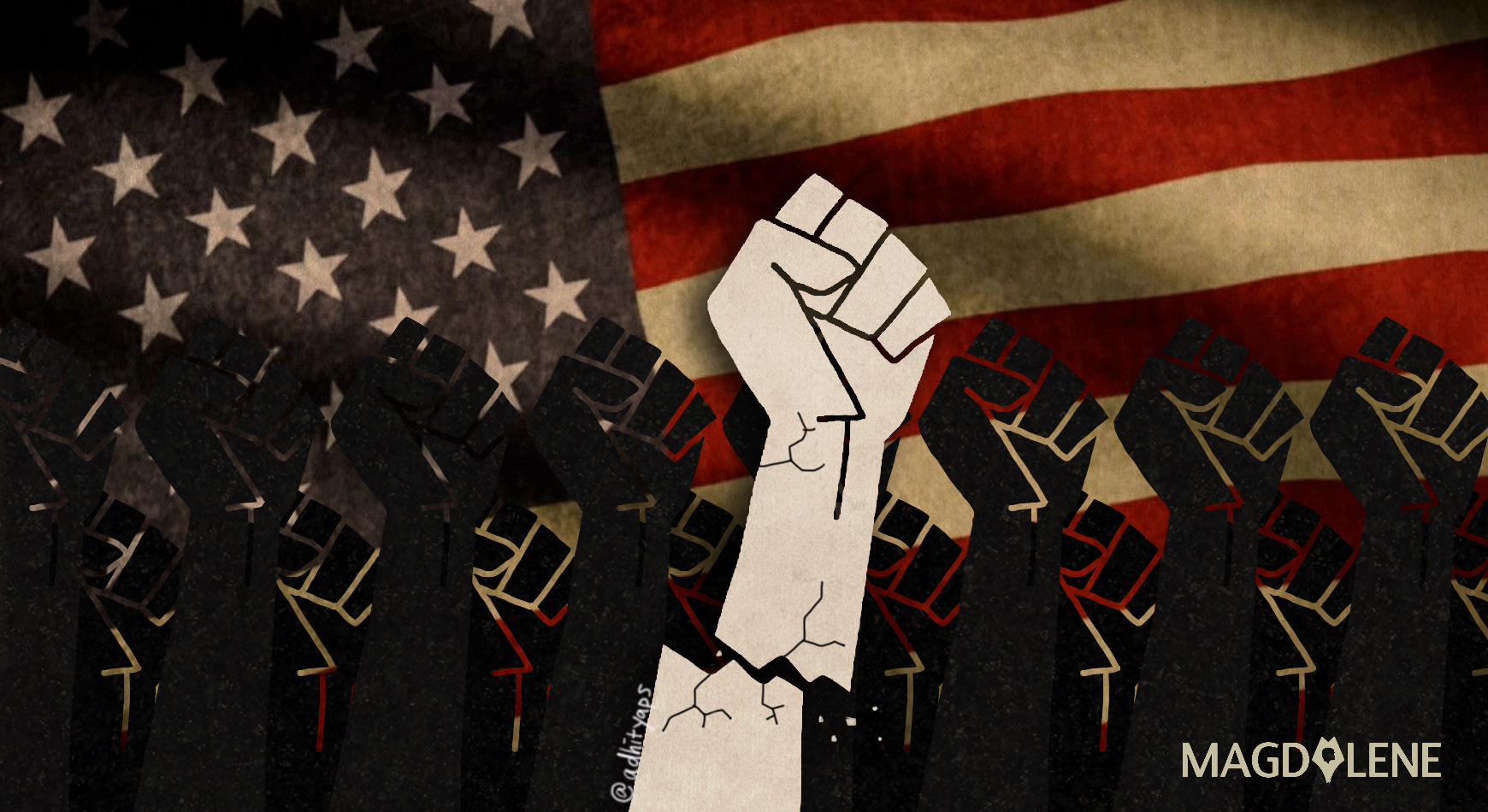I woke up on Nov. 9, 2016 in disbelief. Hillary Clinton was not projected to win the American presidency in a landslide. It was a nail-biting morning turn into a heartbreaking evening. The mood was summed up by a comparison of two images: a group of white men in suits and “Make America Great Again” caps shouting gleefully, while miles away from them, a group of women of different races were sobbing.
The United States of America still has no any female president, and instead picked one of the most unsuitable men in its history to lead the republic and the world. Several pundits blamed Clinton’s vanity and insider status, being a former First Lady and a former Secretary of State. Millionaire Trump was, ironically, seen as the everyman.
Some Indonesian analysts blamed the lower voter turnout, especially among black voters. Some blamed Clinton for failing to inspire the public and the poor, some others blamed the American public for being lazy and ignorant. They warned Indonesian leaders against being hostile and ignorant to the poor, and warned Indonesian voters against political indifference and tribalism.
Still missing from our attention is the systematic voter suppression in the U.S. targeted at black and Native American voters. The Supreme Court had weakened the Voting Rights Act in 2013, and since states manage elections in United States, they can bend some rules in a move that would be unthinkable in Indonesia, such as moving polling stations into remote venues, scrutinizing voters’ IDs, and, if all else fails, prolonging the waiting time and declaring that the voting machines are faulty.
Two years ago, I blamed white Britons and Americans for being selfish. As you know, the majority of white women voted for Trump, despite his sexist and misogynist behavior. I don’t agree with the analysis that Trump won because of widespread inequality and poverty in United States. Compared to white Americans, African and Latinx Americans were more affected by automation and inequality and are still more economically vulnerable, and yet they voted for Clinton. Especially black women.
Some white readers of my piece on The Jakarta Post were not happy with my charge. A Briton e-mailed me his 2,000 words essay on overpopulation. At first it seemed off-topic, but then I understood his thought. Many white people are worried that they will be outnumbered by people of color in the West, and decide that isolationism, either from the European Union or the world, is a better option.
A severe contest is taking place in our world, between those who believe in progress, change, and inclusion, and those who believe in tradition, homogeneity and maybe prejudice. Some cynical people said that Trump presidency would be “interesting”, as he would expose America’s decadence, or that he would turn international politics into adult cartoon, like South Park.
Trump gave free passes for tyrants and anti-democratic leaders to lead with impunity. The patriarchal fear that drove Britons and Americans to vote for Brexit and for Trump has been shared worldwide. In Indonesia and many other non-Western countries, homophobia has become a potent political commodity. Political leaders and the public believe that queer people will weaken the nation, deny more babies for the nation, and is a Western import (or Jewish plot), never mind that traditional cultures worldwide include homosexuality and gender fluidity.
Feminists and anti-feminists are fighting each other in Asia. In Indonesia, we demand justice for rape survivors, we demand the end of catcalling and harassment, and we demand justice for marginalized women. On the other hand, we have people including self-proclaimed progressive people (mostly men but also women) dismissing feminists as “SJW” (social justice warriors), and arguing that feminism isn’t practical in Indonesia.
Other feminists in Asia have it harder. Korean women have lost jobs for liking or following a pro-feminism account, as anti-feminists would harass and lobby their employers to fire them, and reward businesses that have done so. Pro-government drone accounts harass feminists and female journalists in the Philippines, India and the Middle East. China might have identified feminists as enemies of the state.
I have met so many wonderful people over the last two years. We are united by common feelings: Yes, we don’t like the world we live in, but we are doing our part to make it better. We resist patriarchy and we speak up for human rights. We demand better. We miss Ahok. We are thankful that the president of Indonesia is someone like Jokowi, while still aware of his shortcomings and faults.
We are encouraged by the growing progressivism and inclusivity in movies, music, TV shows, and books both in Indonesia and the U.S. We learn more about our great world – feminist memes from Malaysia, Asian-Australian novels, Canadian pop, and black queer comedy. We learn all the complexities of trans rights, being a Muslim feminist, and disability rights.
Ideally, I would enjoy my interests in women’s football, female super heroes, and life in Scandinavia in a world where the POTUS is Hillary Clinton. But Trump won because millions of Americans hated those three things. Gay pride is a norm in women’s football and basketball, the wildly popular female superheroes unsettle insecure men, and many Britons and Americans believe that Sweden is a country taken over by feminists & Muslims.
I began writing this article when things are beginning to turn around. Americans have elected a Native American governor, two queer governors, two Muslim congresswomen, and overall, 100 women into the House of Representative. We can teach the United States several things, but we can also learn many things from them.
Amid the popularity of political machismo worldwide (Brazil being the latest victim), feminism still can influence public discourse, both online and on the street. We can’t take this for granted, and we have to keep the chance to voice our concerns and ideas open. I want an Indonesia where Magdalene stays accessible for local and international readers.
Find out how a lesser known romance novel goes deeper on Singapore than Crazy Rich Asians and follow @MarioRustan on Twitter.









Comments